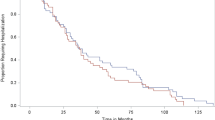Abstract
Background and Objective
Optimization strategies with infliximab (IFX) are increasingly used as rescue therapy for steroid refractory acute severe ulcerative colitis (ASUC). We aim to determine if intensified IFX induction improves colectomy rate and identifies outcome predictors.
Methods
Hospitalized adult patients who received IFX for ASUC between 2010 and 2016 were identified. We compared standard inductions (5 mg/kg) vs high-dose induction (10 mg/kg) with 3-month colectomy rate as primary outcome.
Results
Seventy-two patients (62.5% male, median age 38.5) were identified. Thirty-seven patients (51.3%) received 5 mg/kg IFX and 35 received 10 mg/kg. Baseline clinical, biochemical and endoscopic parameters were well matched between these two groups. 10 mg/kg was more likely to be used by clinicians from 2014 onwards (p < 0.001). Three-month colectomy rate was 9.7%; which was not significantly different between the standard (5.4%) and high-dose (14.3%) IFX induction (p = 0.205). CRP ≥ 60 (OR 10.9 [95% CI 1.23–96.50], p = 0.032), hemoglobin ≤ 90 g/L (OR 15.6 [95% CI 2.61–92.66], p = 0.036) and albumin < 30 g/L (OR 9.4 [95% CI 1.06–83.13], p = 0.044) were associated with increased risk of colectomy at 3 months in univariate regression analysis.
Conclusion
Use of high-dose infliximab rescue therapy did not improve 3-month colectomy-free survival in this cohort. Tailored use in high-risk patients may be beneficial although further validation is required.

Similar content being viewed by others
References
Truelove SC, Jewell DP. Intensive intravenous regimen for severe attacks of ulcerative colitis. Lancet (Lond Engl). 1974;1:1067–1070.
Travis SP, Farrant JM, Ricketts C, et al. Predicting outcome in severe ulcerative colitis. Gut. 1996;38:905–910.
Jarnerot G, Rolny P, Sandberg-Gertzen H. Intensive intravenous treatment of ulcerative colitis. Gastroenterology. 1985;89:1005–1013.
Cima RR. Timing and indications for colectomy in chronic ulcerative colitis: Surgical consideration. Dig Dis (Basel, Switz). 2010;28:501–507.
de Silva S, Ma C, Proulx MC, et al. Postoperative complications and mortality following colectomy for ulcerative colitis. Clin Gastroenterol Hepatol Off Clin Pract J Am Gastroenterol Assoc. 2011;9:972–980.
Mortensen C, Caspersen S, Christensen NL, et al. Treatment of acute ulcerative colitis with infliximab, a retrospective study from three Danish hospitals. J Crohn’s Colitis. 2011;5:28–33.
Jarnerot G, Hertervig E, Friis-Liby I, et al. Infliximab as rescue therapy in severe to moderately severe ulcerative colitis: a randomized, placebo-controlled study. Gastroenterology. 2005;128:1805–1811.
Gardiner KR, Halliday MI, Barclay GR, et al. Significance of systemic endotoxaemia in inflammatory bowel disease. Gut. 1995;36:897–901.
Kevans D, Murthy S, Iacono A, Silverberg MS, Greenberg GR. Sa2031 Accelerated clearance of serum infliximab during induction therapy for acute ulcerative colitis is associated with treatment failure. Gastroenterology. 2012;142:S-384-S-5.
Brandse JF, van den Brink GR, Wildenberg ME, et al. Loss of infliximab into feces is associated with lack of response to therapy in patients with severe ulcerative colitis. Gastroenterology. 2015;149:350-5.e2.
Herfarth HH, Rogler G, Higgins PD. Pushing the pedal to the metal: should we accelerate infliximab therapy for patients with severe ulcerative colitis? Clin Gastroenterol Hepatol Off Clin Pract J Am Gastroenterol Assoc. 2015;13:336–338.
Shah S, Naymagon S, Sands BE, Cohen BL, Dubinsky M. Mo1908 colectomy free survival is independent of initial infliximab dosing strategy in hospitalized ulcerative colitis patients. Gastroenterology. 2016;150:S813.
Sjoberg M, Magnuson A, Bjork J, et al. Infliximab as rescue therapy in hospitalised patients with steroid-refractory acute ulcerative colitis: a long-term follow-up of 211 Swedish patients. Aliment Pharmacol Ther. 2013;38:377–387.
Shah SC, Naymagon S, Panchal HJ, Sands BE, Cohen BL, Dubinsky MC. Accelerated infliximab dosing increases 30-day colectomy in hospitalized ulcerative colitis patients: a propensity score analysis. Inflamm Bowel Dis. 2018;24:651–659.
Silverberg MS, Satsangi J, Ahmad T, Arnott ID, Bernstein CN, Brant SR, et al. Toward an integrated clinical, molecular and serological classification of inflammatory bowel disease: report of a Working Party of the 2005 Montreal World Congress of Gastroenterology. Canadian journal of gastroenterology = Journal canadien de gastroenterologie. 2005;19 Suppl A:5a-36a.
Gibson DJ, Heetun ZS, Redmond CE, et al. An accelerated infliximab induction regimen reduces the need for early colectomy in patients with acute severe ulcerative colitis. Clin Gastroenterol Hepatol Off Clin Pract J Am Gastroenterol Assoc. 2015;13:330-5.e1.
Caprilli R, Latella G, Vernia P, Frieri G. Multiple organ dysfunction in ulcerative colitis. Am J Gastroenterol. 2000;95:1258–1262.
Lennard-Jones JE, Ritchie JK, Hilder W, Spicer CC. Assessment of severity in colitis: a preliminary study. Gut. 1975;16:579–584.
Arias MT, Vande Casteele N, Vermeire S, et al. A panel to predict long-term outcome of infliximab therapy for patients with ulcerative colitis. Clin Gastroenterol Hepatol Off Clin Pract J Am Gastroenterol Assoc. 2015;13:531–538.
Seow CH, Newman A, Irwin SP, Steinhart AH, Silverberg MS, Greenberg GR. Trough serum infliximab: a predictive factor of clinical outcome for infliximab treatment in acute ulcerative colitis. Gut. 2010;59:49–54.
Gonczi L, Vegh Z, Golovics PA, et al. Prediction of short- and medium-term efficacy of biosimilar infliximab therapy. Do trough levels and antidrug antibody levels or clinical and biochemical markers play the more important role? J Crohn’s Colitis. 2016;11:697–705.
Rosen MJ, Minar P, Vinks AA. Review article: applying pharmacokinetics to optimise dosing of anti-TNF biologics in acute severe ulcerative colitis. Aliment Pharmacol Ther. 2015;41:1094–1103.
Fasanmade AA, Adedokun OJ, Ford J, et al. Population pharmacokinetic analysis of infliximab in patients with ulcerative colitis. Eur J Clin Pharmacol. 2009;65:1211–1228.
Acknowledgments
The co-authors would like to thank Janie Coulombe for her kind assistance with the statistical analysis of the study data.
Author information
Authors and Affiliations
Corresponding author
Ethics declarations
Conflict of interest
None declared by all co-authors.
Additional information
Co-First Authors: Che-Yung Chao, Alex Al Khoury
Rights and permissions
About this article
Cite this article
Chao, CY., Al Khoury, A., Aruljothy, A. et al. High-Dose Infliximab Rescue Therapy for Hospitalized Acute Severe Ulcerative Colitis Does Not Improve Colectomy-Free Survival. Dig Dis Sci 64, 518–523 (2019). https://doi.org/10.1007/s10620-018-5358-z
Received:
Accepted:
Published:
Issue Date:
DOI: https://doi.org/10.1007/s10620-018-5358-z




